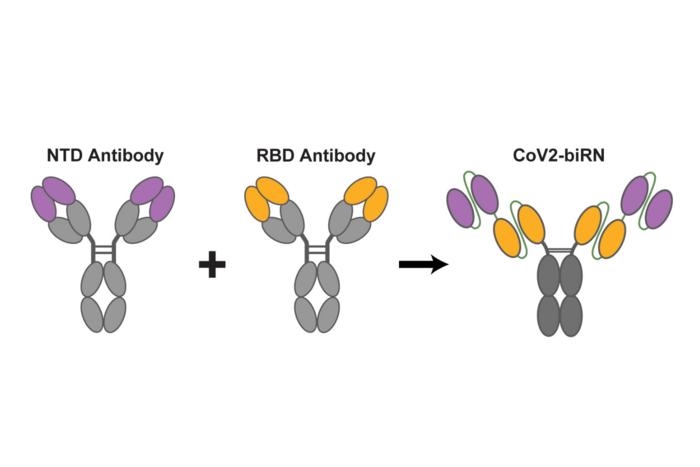In a significant breakthrough against the relentless evolution of the SARS-CoV-2 virus, researchers from Stanford University have engineered a novel class of bispecific antibodies that promise more effective treatment options against COVID-19 and its variants. The ongoing struggle to mitigate the impact of the virus has demonstrated the need for treatments that can adapt to the rapid mutations it undergoes. Most previously developed antibody therapies have diminished in effectiveness as the virus continues to evolve, leaving a critical gap in our arsenal against COVID-19.
The research led by Christopher O. Barnes and doctoral candidate Adonis Rubio reveals a promising approach to enhance the durability of antibody treatments. Through their innovative engineering, the team designed a unique combination of two antibodies—termed “CoV2-biRN”—to work synergistically to target the virus. This intricate interplay between the antibodies illustrates the pioneering strategies that modern science is leveraging to combat highly mutable pathogens. One antibody serves as an anchor, binding to a relatively stable region of the virus, while the other plays a crucial role in neutralizing its infectivity.
Laboratory tests have shown that these dual antibodies effectively neutralize various variants of SARS-CoV-2, including those emerging during the pandemic, and provide substantial protection against the damaging effects of the virus in animal models. The study highlights how the stability of one antibody can facilitate the action of another, thereby optimizing the immune response. This strategy exemplifies a shift in how researchers approach viral treatment, allowing for a proactive rather than reactive stance against an evolving virus.
Initially overlooked for therapeutic potential, the targeted area within the Spike N-terminal domain (NTD) has now emerged as a critical focal point in treatment development. By strategically binding to the NTD, the first antibody effectively immobilizes the virus, allowing the second antibody to target the receptor-binding domain (RBD), a region essential for the virus’s infection capabilities. This clever tactic not only enhances therapeutic efficacy but also opens avenues for addressing future variants that may arise.
The potential applications of this innovative approach extend beyond the current pandemic. The researchers are aspiring to expand their bispecific antibody design to target a broader spectrum of coronaviruses, which includes not only SARS-CoV-2, but also other members of the coronavirus family, including those responsible for common colds. By confronting COVID-19 at its roots, this research also holds promise for countering other viral threats such as influenza and HIV, thereby broadening its impact in the realm of infectious disease treatment.
“The challenge posed by the evolving nature of the coronavirus obliges us to rethink our strategies for developing effective therapeutics,” Barnes remarked. The ability of viruses to mutate makes the design of therapeutics a race against time, where adaptability becomes paramount. As researchers extend their reach into wider applications, the focus remains on ensuring that the antibodies can keep pace with viral evolution.
The initial stages of this groundbreaking research were propelled by the antibodies collected from COVID-19 survivors. By deciphering the intricate interactions between these antibodies and the virus, the researchers could pinpoint specific characteristics that govern their effectiveness. The discovery journey underscores the power of immune responses elicited during natural infections, paving the way for engineered solutions that harness those very responses in a clinical setting.
Looking ahead, the pathway to translating these findings into human treatments will necessitate further investigation, including clinical trials. However, the optimistic outlook for bispecific antibodies points towards a future where treating COVID-19 is less hindered by the virus’s capacity for mutation. The immediate goal remains focused on establishing the safety and efficacy of this approach in human subjects.
As science progresses, the incorporation of multidisciplinary collaboration has proven indispensable. The team benefited from contributions across various fields, encompassing immunology, virology, and tropical medicine, revealing that tackling complex health challenges requires a conjoined effort of experts from diverse backgrounds. This collaborative model fosters innovation that aligns well with the complexities of infectious diseases.
Furthermore, this work received robust support from distinguished institutions, including the Chan Zuckerberg Biohub and the Howard Hughes Medical Institute. Grants from the National Institutes of Health and National Science Foundation also underline the importance of sustained funding in advancing critical healthcare research. Complicated interdisciplinary projects like this one serve as reminders that research is a collective endeavor that demands not only scientific rigor but also communal resilience.
In conclusion, the pursuit of durable solutions against SARS-CoV-2 through the development of bispecific antibodies marks a notable advance in the quest for a robust therapeutic response. As this frontier of research evolves, the stakes grow ever higher, propelling scientists to innovate methods that can withstand the test of time and nature’s unpredictability. This study not only addresses the immediate challenges posed by COVID-19 but also embodies a broader vision for therapeutic strategies facing future viral threats.
As the team continues to forge ahead in their investigations, we look forward to the exciting developments that may emerge in the landscape of antiviral therapeutics—an area that holds even more potential for future public health advancements.
Subject of Research: Bispecific antibodies targeting SARS-CoV-2 variants
Article Title: Bispecific antibodies targeting the N-terminal and receptor binding domains potently neutralize SARS-CoV-2 variants of concern
News Publication Date: 5-Mar-2025
Web References: http://dx.doi.org/10.1126/scitranslmed.adq5720
References: Not specified
Image Credits: Christopher O. Barnes/Adonis Rubio
Keywords: COVID 19, Antibody therapy, SARS CoV 2, Antibodies
Tags: advanced strategies against mutating pathogensantibody effectiveness against COVID-19 variantsbispecific antibodies for COVID-19 treatmentcombating COVID-19 variantsCoV2-biRN antibody combinationdual antibody approach for virus neutralizationdurable treatments against evolving virusesinnovative engineering in antibody designnovel antibody therapies for SARS-CoV-2protecting against SARS-CoV-2 mutationsSARS-CoV-2 research breakthroughsStanford University COVID-19 research





